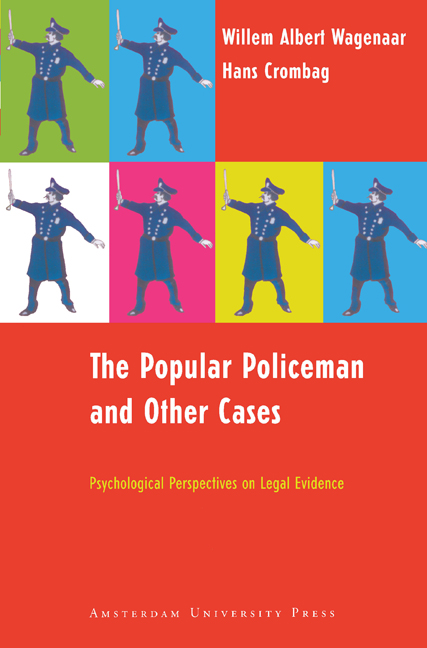Book contents
- Frontmatter
- Contents
- Foreword
- 1 Illegal Gambling or the Victory Travel Club
- 2 On Causal Reasoning or Death in the Warmoesstraat
- 3 Consumer Confusion or Potato Chips and Olive Oil
- 4 Fiction and Reality of ‘the Average Individual’ or the Case of Old Mr. Lane
- 5 Case Histories and Scientific Proof or the Case of JR
- 6 Not a Good Story or the Disappearance of Maddy and Vicky
- 7 Conflicting Scenarios or the Case of the Man who Needed a Companion
- 8 Two Processes Obstructing the Accuracy of Long-Term Memory or the Case of the Stolen Mercedes
- 9 Confessions after Repeated Interrogation or the Putten Murder Case
- 10 Collaborative Storytelling or the Artist’s Models and an Angry Neighbourhood
- 11 Allegation of Sexual Child Abuse in a Case of Disputed Visitation or Cindy's Story
- 12 Psychogenic Amnesia or the Case of the Amnesic Strangler
- 13 Obeying Reflexes or Death on the Climbing Wall
- 14 Visual Acuity or Shooting Mimi the Cat
- 15 Sexual Semiotics or the Case of the Popular Policeman
- Postscript: Psychological Expertise and the Law
- Bibliography
- Name Index
- Subject Index
8 - Two Processes Obstructing the Accuracy of Long-Term Memory or the Case of the Stolen Mercedes
Published online by Cambridge University Press: 16 February 2021
- Frontmatter
- Contents
- Foreword
- 1 Illegal Gambling or the Victory Travel Club
- 2 On Causal Reasoning or Death in the Warmoesstraat
- 3 Consumer Confusion or Potato Chips and Olive Oil
- 4 Fiction and Reality of ‘the Average Individual’ or the Case of Old Mr. Lane
- 5 Case Histories and Scientific Proof or the Case of JR
- 6 Not a Good Story or the Disappearance of Maddy and Vicky
- 7 Conflicting Scenarios or the Case of the Man who Needed a Companion
- 8 Two Processes Obstructing the Accuracy of Long-Term Memory or the Case of the Stolen Mercedes
- 9 Confessions after Repeated Interrogation or the Putten Murder Case
- 10 Collaborative Storytelling or the Artist’s Models and an Angry Neighbourhood
- 11 Allegation of Sexual Child Abuse in a Case of Disputed Visitation or Cindy's Story
- 12 Psychogenic Amnesia or the Case of the Amnesic Strangler
- 13 Obeying Reflexes or Death on the Climbing Wall
- 14 Visual Acuity or Shooting Mimi the Cat
- 15 Sexual Semiotics or the Case of the Popular Policeman
- Postscript: Psychological Expertise and the Law
- Bibliography
- Name Index
- Subject Index
Summary
It is not uncommon for witnesses to be asked about events that occurred a long time, even years ago. A case in point is the notorious case against John Demjanjuk, who was accused of war crimes in the German extermination camp Treblinka in the years 1942 to 1943.In the period 1979 to 1987,the witnesses were asked to remember what happened and especially to identify Demjanjuk, 37 to 45 years after the event. Understandably, the question was raised as to whether memories may be trusted after such a long period of time (Wagenaar, 1988b). Ever since Herman Ebbinghaus (1885/1966), we know that memory deteriorates with time. We also know that it may become distorted, either by new information or by a sequence of continuous overt or covert rehearsals. In most instances it is unrealistic to assume that memories remain fresh and unchanged across a period of many years. Especially the problem of change over time is highly relevant when the events were personally significant and have therefore continued to play a role in a person's life. In that case it will be difficult to decide what new information was received after the event, which aspects were rehearsed, how often, to what purpose, and how the ‘refreshing process’ may have changed the details. The case of the stolen Mercedes, discussed in this chapter, is less spectacular than the Demjanjuk case, but the challenges to the witnesses’ memories may have been equally formidable. The case is chosen primarily because it offers an apt illustration of the difference between the two major types of forgetting: loss of accessibility, and change through post-event information.
The case of the stolen Mercedes
Mr. Dukes owned a very expensive Mercedes. He always parked it on the premises, never in the street, and it had a sophisticated alarm system. Mr. Dukes was always careful to activate the alarm when he left the car for the night. On the night of 19 December 1995 he came home around 11.30 PM. He parked the Mercedes, activated the alarm (or so he says) and went to bed. The next morning was a Saturday and Mr. Dukes slept late. He got up around 9 AM and discovered to his horror that the Mercedes was no longer where he had parked it. Fortunately, the car was insured with the reliable insurance company Safetycar.
- Type
- Chapter
- Information
- The Popular Policeman and Other CasesPsychological Perspectives on Legal Evidence, pp. 123 - 142Publisher: Amsterdam University PressPrint publication year: 2012



